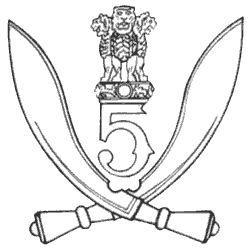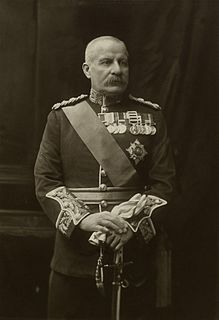
5th Gorkha Rifles, also abbreviated as 5 GR(FF) is an infantry regiment of the Indian Army comprising Gurkha soldiers of Nepalese origin. It was formed in 1858 as part of the British Indian Army. The regiment's battalions served in the First World War (Mesopotmia) and Second World War.

The 5th Indian Infantry Division was an infantry division of the Indian Army during World War II that fought in several theatres of war and was nicknamed the "Ball of Fire". It was one of the few Allied divisions to fight against three different armies - the Italian, German and Japanese armies.

General Sir Geoffry Allen Percival Scoones, was a senior officer in the Indian Army during the Second World War.
Major-General Berthold Wells Key,, known as Billy Key, was a British Indian Army officer.

The 12th Frontier Force Regiment was formed in 1922 as part of the British Indian Army. It consisted of five regular battalions; numbered 1 to 5 and the 10th (Training) Battalion. During the Second World War a further ten battalions were raised. In 1945, the prenominal "12th" was dropped when the British Indian Army dispensed with prenominal numbering of its regiments. After the independence in 1947, it was formed into the Frontier Force Regiment, part of the army of Pakistan.
Iraqforce was a British and Commonwealth formation that came together in the Kingdom of Iraq. The formation fought in the Middle East during World War II.

General Sir William Platt was a senior officer of the British Army during both World War I and World War II.
Lieutenant-General Sir Harold Rawdon Briggs, was a senior British Indian Army officer, active during World War I and World War II and the post-war era.
Lieutenant General Sir Dudley Russell KBE, CB, DSO, MC was a senior officer of both the British Army and the British Indian Army, and served during World War I and World War II, where he commanded the 8th Indian Infantry Division during the Italian Campaign from late 1943 until the end of the war.

Major General Thomas Wynford Rees was an officer in the British Indian Army during World War I, the interwar years, World War II, and after it.
Donald Powell Distinguished Service Order (1896–1942) was an officer in the British Indian Army during World War I and World War II
Brigadier Ronald Gervase Mountain was an officer in the British Indian Army during World War I and World War II.
Lieutenant Colonel Bernard Campbell Fletcher DSO, MC was an officer of the British Army active during the First World War and later the Second World War.
Major-General James Bruce Scott was a British Indian Army officer who commanded the 1st Burma Division during the Japanese invasion of Burma in 1942.

Field Marshal Sir Charles Comyn Egerton was a senior Indian Army officer from the Egerton family.
General Sir Alan Fleming Hartley, was a British Indian Army officer during the Second World War.
See Guy Baldwin for the psychotherapist, author, activist, and educator specializing in issues of particular relevance to the BDSM and leather communities.
Lieutenant-Colonel Arthur Kennedy Rawlins was a British Indian Army officer.
Lieutenant General Shankarrao Pandurang Patil (SPP) Thorat, KC, DSO was a General Officer in the Indian Army. He was the General Officer Commanding-in-Chief Eastern Command in the lead up to the 1962 Sino-Indian War.
Lieutenant-General Sir Skipton Hill Climo was a British officer of the Indian Army.






